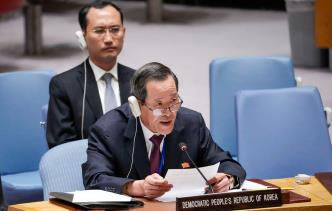
Earlier this month, North Korea demonstrated that it remains — in Pyongyang’s mind at least — a world power.
After more than 16 months without a missile test, and two months after the Hanoi summit with US President Donald Trump, North Korea launched a new solid-fuel short-range ballistic missile, two separate multiple rocket launch systems and a new short-range ballistic missile with increased range for this type of system.
What is going on here?
First, the US and South Korea, as well as other regional actors, agree that North Korea is not breaking any agreements made at the Hanoi summit or previously. Both South Korea and the US went to great lengths to downplay the significance of the tests, while Pyongyang said the launch was solely for the military’s benefit.
“The recent drill conducted by our army is nothing more than part of the regular military training, and it has neither targeted anyone nor led to an aggravation of the situation in the region,” Pyongyang said.
It is important to understand that North Korea’s self-imposed moratorium on missile testing is still in effect.
The Trump policy on North Korea mirrors other international security issues facing the White House in terms of the future of arms control, especially with Russia and China. Naturally, North Korea’s missile tests threaten Japan and South Korea as well as US forces in the region. Nevertheless, there are still local forces at play when missile threat and response are tied to regional dynamics.The North Korean missile tests follow the new US and South Korea Dong Maeng joint military exercise, which replaced older exercise models such as Foal Eagle and Key Resolve as part of the North Korean negotiation process. The restructuring of exercises is important because the ability to cut costs on these activities helps divert US defense spending into other more necessary options in the region.
Let us be clear: Negotiating with North Korea is not a game and is anything but smooth. The Trump approach is “give and take, up and down.” North Korean leader Kim Jong-un and his missile gurus are aware their national program must be kept active. Kim is committed to a strong national defense, while negotiating with both Washington and Moscow on how to move forward.
North Korea needs a “self-reliant national defense” with Pyongyang stepping back from the ICBM versions of its missile program. If that holds, it will be a major step forward in reducing the missile threat. Hawaii will remain safe.
Amid the flurry of accusations regarding the direction the North Korean talks are taking, Pyongyang is seeking to demonstrate Kim’s prowess against the Trump-styled zig-zag policy.
“All or nothing” was just a ploy at the Hanoi summit, and Kim’s response a few weeks later regarding US Secretary of State Mike Pompeo’s inability to deliver is all part of the theater.
However, this time it may be different for Pyongyang since the country faces, for the first time, a real path out of its isolation in exchange for concessions. Although North Korea says that the US has until the end of 2019 to conclude a “deal,” that type of talk is also part of the theater. New attributes are feeding into the emerging regional security formula, including infowar, desire for reunification, Beijing’s security interests, and Russia’s ability to be the spoiler or the winner.
The US is putting pressure on North Korea in other ways by seizing ships and reducing Pyongyang’s reach around the world. Sanctions targeting Russia’s Gatchina surface-to-air missile training academy, the weapons maker Instrument Design Bureau (KBP) Tula and the Moscow Machine Building Plant Avangard will encourage Moscow to remember that Washington has a say in what happens next. Certainly, this “maximum pressure” is creating the conditions to further reduce tensions on the Korean Peninsula.
Overall, talks will continue with many periods when the process appears to be falling apart. But within the scope of the new international security relations developing in the region, the current direction of negotiations should help to reduce threat and build trust.












